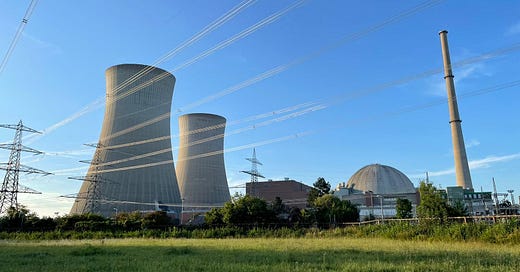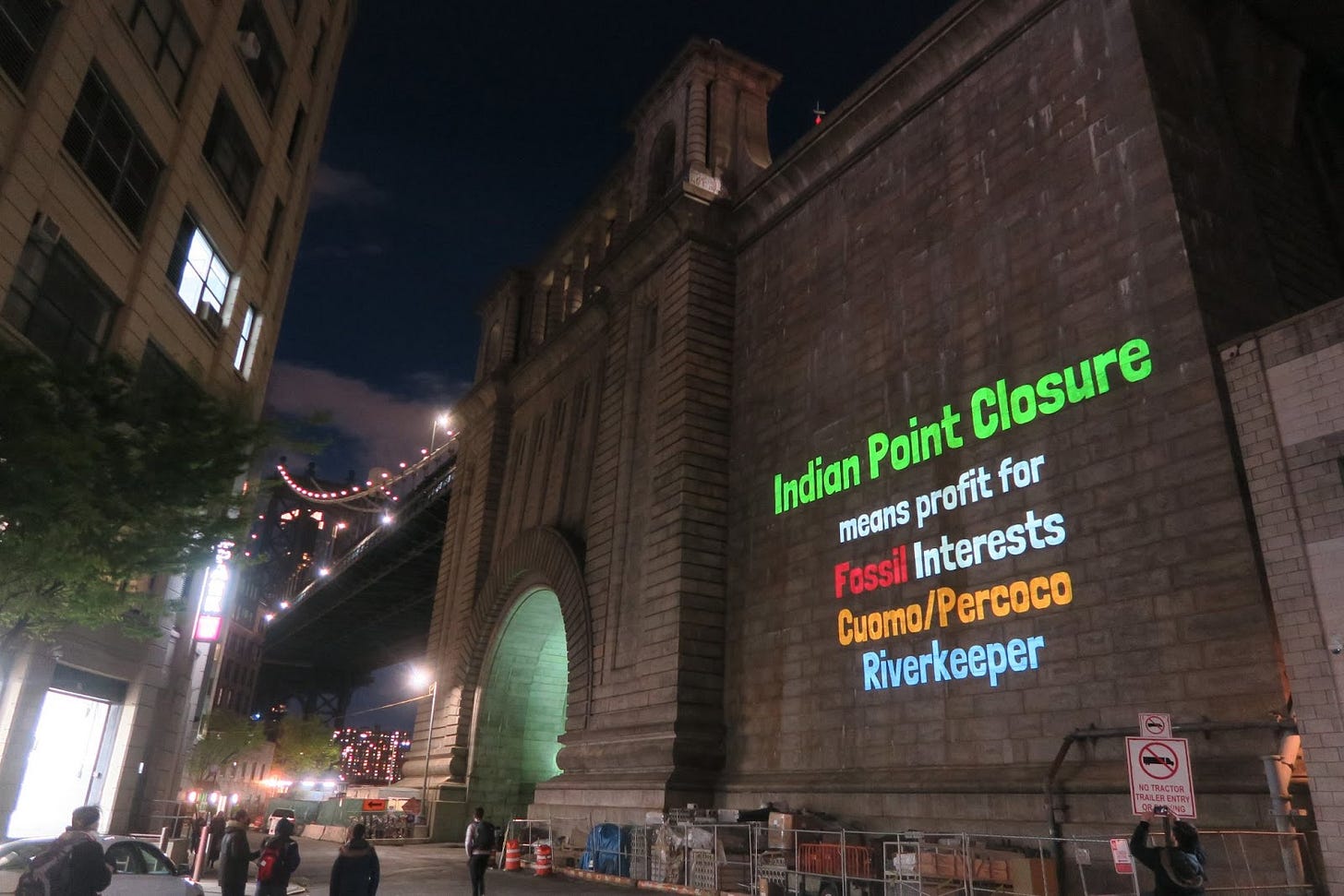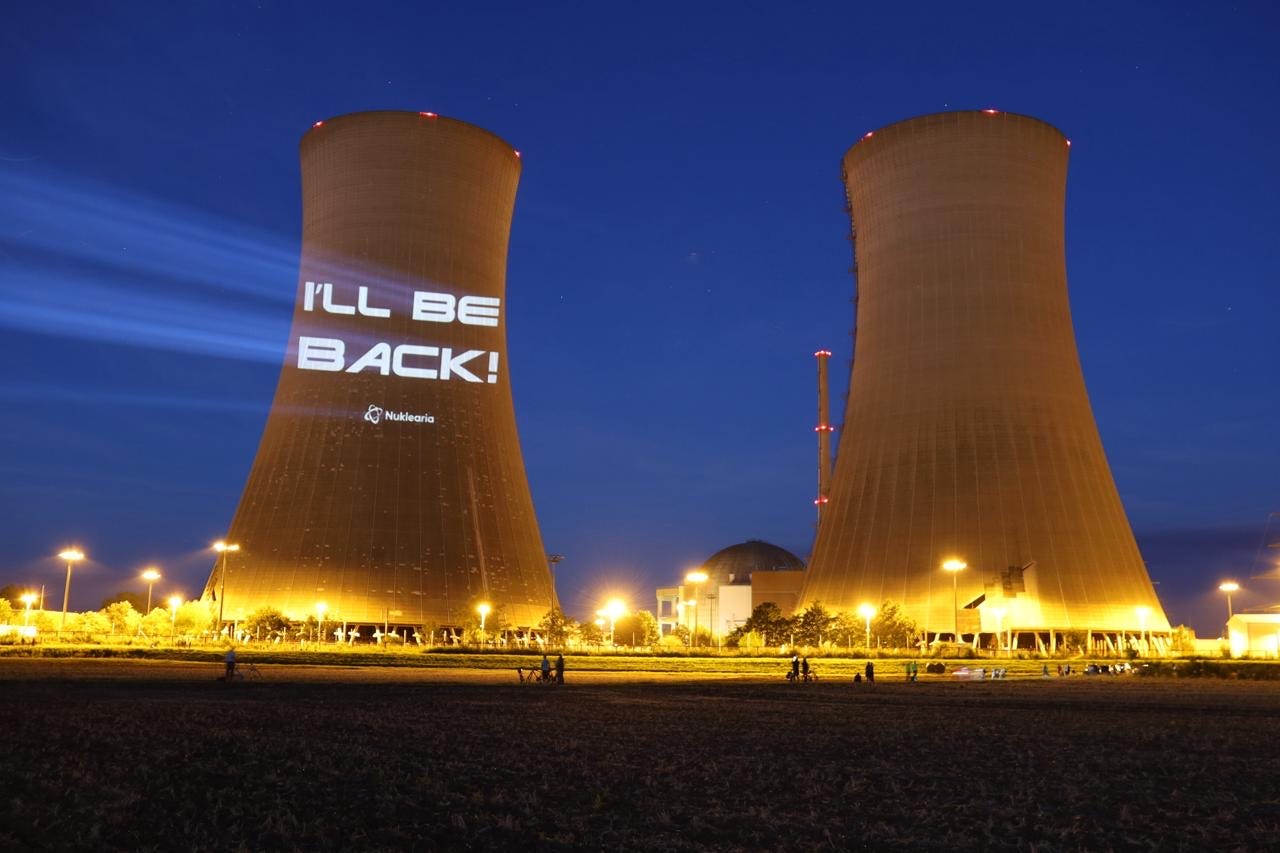The pro-nuclear movement is winning
A brief forecast involving projections, climbing towers, and shifting sands
“You philosophers are lucky men. You write on paper, which is patient. Unfortunate Empress that I am, I write on the susceptible skins of living beings.” - Catherine the Great
These cooling towers belong to the Grafenrheinfeld nuclear power plant, which operated from 1981 to 2015. It was taken offline as part of Germany’s policy to phase out nuclear energy. Take a good look at this photograph, because the cooling towers were demolished today, and this is one of the last photos of them ever taken. The forecast for nuclear energy in Germany? Dust clouds.
Naysayers will argue that Germany doesn’t need these towers, but a study found that had the country opted to retain nuclear energy, “Germany could have reached its climate gas emission target by achieving a 73% cut in emissions on top of the achievements in 2022 and simultaneously cut the spending in half compared to Energiewende.”
Don’t despair - the good news is that turnaround can happen much more rapidly than you might expect. Most Germans already support nuclear energy, and today, my German friend Andreas Fichtner climbed a tower in the Grafenrheinfeld demolition zone to protest the event, telling me, “I’ve basically watched this coming for 20 years. Life experience has shown me how absolutely insane a decision nuclear phase out was. A car crash in slow motion when suddenly you realise the airbag isn’t working and you don’t have a seatbelt”.

When I first started advocating for nuclear energy in Britain a few years ago, the leader of the country and Conservative Party, David Cameron, spoke against nuclear energy, and public support for it was low. Now, both major parties blame each other for not building nuclear power plants, and public opinion is in favour of new nuclear.
After watching the trend of anti nuclear activists, usually Greenpeace, projecting inane messages onto cooling towers for many years, I decided to fight back and in 2021, with volunteers from Emergency Reactor, I organised an action where we projected messages onto key government buildings across London.
This was a first for the pro nuclear movement, and it began a trend of pro nuclear projections, as I was contacted by other nuclear advocates asking about the logistics of doing similar actions. Voices for Nuclear followed suit in Paris, as did Nuclear New York, another group in San Francisco, and a host of others. As people lit up buildings around the world with slogans for nuclear energy, politicians began to change their minds.
Rarely a day goes by where I don’t see people arguing that China is winning the race on nuclear. It’s true that China is building reactors quickly, but economists are also expecting the country’s economy to slow down. Add to this a low birth rate in a country that relies heavily on large numbers of workers, and it’s not difficult to see where this is heading. Although most countries are facing the same problem of declining birth rates, they can also rely on immigrants to fill worker gaps. China has proposed increasing immigration, but Chinese people have not responded well to the idea.
The forecast is bright
This summer, America entered the race. The US government created its first comprehensive nuclear energy bill since 2005: The ADVANCE Act, which stands for Accelerating Deployment of Versatile, Advanced Nuclear for Clean Energy. Sounds good on paper, but what does it do? A number of things, but the main elements are: reducing barriers to building new nuclear by removing fees, directing the Nuclear Regulatory Commission to develop guidance to licence and regulate microreactor designs within 18 months, and extending protection from liability related to the nuclear industry to 2045.
While other countries are busy focusing on energy saving measures, the US recognises that energy demand is expected to increase due to data centres, electric vehicles, and industrial processes, and it’s laying the foundations to accelerate nuclear to meet that demand. The US has already committed to tripling nuclear capacity, and - perhaps surprisingly, given the polarisation surrounding many issues in the US - the ADVANCE Act passed the Senate and House with an overwhelming number of votes in favour.
Most Americans support nuclear energy, and in just the last few years, the nuclear power plants Diablo Canyon in California and Dresden in Illinois were saved from premature closures. Most notably, Governor Gavin Newsom made a very public U-turn on nuclear energy following a report that found that Diablo was needed to ensure electricity reliability and avoid supply shortfalls in California.
Next up is the Palisades Nuclear Generating Station, a moth-balled nuclear power plant located on Lake Michigan, which ceased to operate in 2022. The US Department of Energy (DOE) has announced a $1.5bn loan to the energy company Holtec to restart Palisades. If successful, the power plant will become the first US nuclear reactor to restart after having its fuel removed and its licence revised to prohibit further operation. It will then produce baseload power until at least 2051.
This has all happened very quickly and will have a significant impact on energy security and supply globally - and that’s before taking into account the new nuclear that is set to be built. The US government is now arguably more pro nuclear than ever before, and this is an important realisation for countries that have made missteps and rejected nuclear energy: it’s never too late to make amends.
The pro nuclear movement is alive and kicking, it has achieved remarkable successes, and it is here to stay. People are increasingly learning through experiencing energy instability that they need nuclear energy to weather the storm. Sooner or later, more politicians will have to catch up or risk being voted out.
While some countries advance, others have taken steps back, but I will leave you with a hopeful image of what might still happen in anti nuclear countries as more people take a stand against ludicrous energy policies. Today, sitting in a tower overlooking the Grafenrheinfeld cooling towers, German citizen Andreas Fichtner made a statement for us all. The now-destroyed towers will never return, but they are an important cautionary tale to the world. Nuclear is necessary. Even in Germany, to paraphrase Arnold Schwarzenegger: someday, it will be back.








Zion's thesis is correct; the pro-nuclear forces are succeeding essentially everywhere, and the negative messaging of Greenpeace et. alii. has largely been rejected. The vast bulk of the taxpaying citizens never cared for their messaging anyway, largely indifferent to their relentless fearmongering.
Ontario is holding public hearings this year and next year on new nuclear power plants in the province. It has no choice, as electricity demand is being driven by population growth. Italy is considering the need for new nuclear power to offset its permanent dependence on imported natural gas. Japan is restarting idled nuclear plants after Fukushima. Britain needs new nuclear simply to replace the existing old nuclear plants that have to be retired over the next decade. Rumania has contracted to build Cernavoda 3 and 4. Poland has partnered to build its first nuclear power plants. UAE wants more NPPs after its success with Barakkah.
But not Germany. It is a lost cause. It was betrayed by corrupt politicians with its political and environmental spheres infiltrated by the Soviet KGB. The corruption was blatant and public, which is how a former German Chancellor ended up as the head of Gazprom. At this time, Germany is doomed to enriching France and whatever neighbours have surplus electricity generated from nuclear power. The KGB and the German coal unions have triumphed in their long campaign against nuclear power, and the result is the growing de-industrialization of Germany.
Thanks for the upbeat report. Nuclear power plants are needed, and this is starting to be recognized by people in a bipartisan way, and it's gathering momentum, which is really good news. When democrats and republicans, environmentalists, climate activists and climate deniers can all start to agree that nuclear is the obvious answer, we'll finally be able to quit arguing and get something positive done. The only trouble is, it takes years to build new power plants, and we're going to go through some lengthy periods of blackout pain while waiting for the new plants to be built.